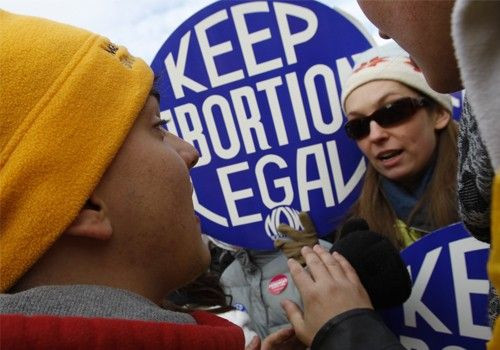Tennessee Abortion Bill Would Publish Names Of Doctors, Demographic Information Of Women

Physicians who perform abortions in Tennessee could have their identities revealed online, while women who receive the procedure could have their demographic information published for public perusal under a new bill pending in the state House of Representatives that is scheduled to come before a committee on Wednesday.
The legislation, known as the Life Defense Act of 2012, would require Tennessee's Department of Health to publish extensive details about women who receive abortions, giving lawmakers a rare chance to make a move that will potentially regulate the controversial procedure.
In 2000, the Tennessee State Supreme Court ruled abortion is a right protected under the state constitution, making it almost impossible for conservative lawmakers to push through some of the divisive abortion-regulating laws that have been popping up across state legislatures in recent months.
The state's Supreme Court decision will be up for reconsideration in 2014, under a legislative move that will place a proposed constitutional amendment on a statewide ballot declaring the Constitution does not secure or protect a right to abortion.
Instead, the Life Defense Act would require the state Department of Health to publish data it already collects about abortion patients. Currently, physicians who perform the procedure must keep a record of each operation and provide those reports to the commissioner of health. Under the new bill, a report of each procedure would be submitted directly to the Department of Health on forms prescribed by the new commissioner of health, including information about: the county and state in which the woman resides, the woman's age, race, marital status and education, the number of prior pregnancies and/or abortions the woman has received, the woman's pre-existing medical conditions, and the identity of the doctor performing the operation.
The legislation makes no mention of collecting the information on the man involved in the each pregnancy's conception. The office of the measure's sponsor, Rep. Matthew Hill, R-Jonesborough, did not immediately return multiple requests for comment.
The reports must be submitted monthly, according to the legislation, which directs the state to prepare a comprehensive annual statistical report based on the data that would be available for public inspection on the department's web site.
Could Information Be Used To Harass Women Who Sought Services?
While the publicly-released reports would not include the names of the women who have terminated their pregnancies, critics said the information that would be released by the measure could potentially be used to identify of some women who receive abortions in small, rural communities.
Even though the Department of Health already reports such information, it currently aggregates the data by region, making it impossible to identify the patients who have underwent an abortion. However, under the Life Defense Act, the department would be required to break down that data by county.
Critics also point out that collecting the names of doctors who perform the operation -- a new mandate under the measure -- could put them in danger if the information is used by abortion opponents to target those physicians.
In an environment where doctors are victims of violence -- and we've had physicians who provide abortion care murdered in the past few years -- I think this is an attempt to intimidate and allow for providers to be terrorized, said Jeff Teague, the president and CEO of Planned Parenthood of Middle and East Tennessee, told the Tennessean.
Abortion providers are frequently the target of violent acts. At least eight doctors have been murdered by anti-aboriton extremists since 1993, according to data from the National Abortion Federation, while another 17 have been victims of murder attempts. There have been even more cases of arson, bomb threats, and bombings of abortion clinics during that period.
Some state's have even attempted to essentially legalize justifiable homicide attacks against abortion providers, under the guise that that the killings were intended to prevent harm to a fetus. The South Dakota and Nebraska Legislatures both proposed and eventually shelved bills, that would allow a pregnant woman or family member to use lethal force to protect an unborn fetus, a measure critics argue could be used to defend individuals who attack abortion providers.
Although Hill, in an interview with the newspaper, insisted the legislation simply asks that the data [the Department of Health} already collect be made public, he added the idea for the bill came from the anti-abortion group Tennessee Right to Life.
--
© Copyright IBTimes 2025. All rights reserved.





















